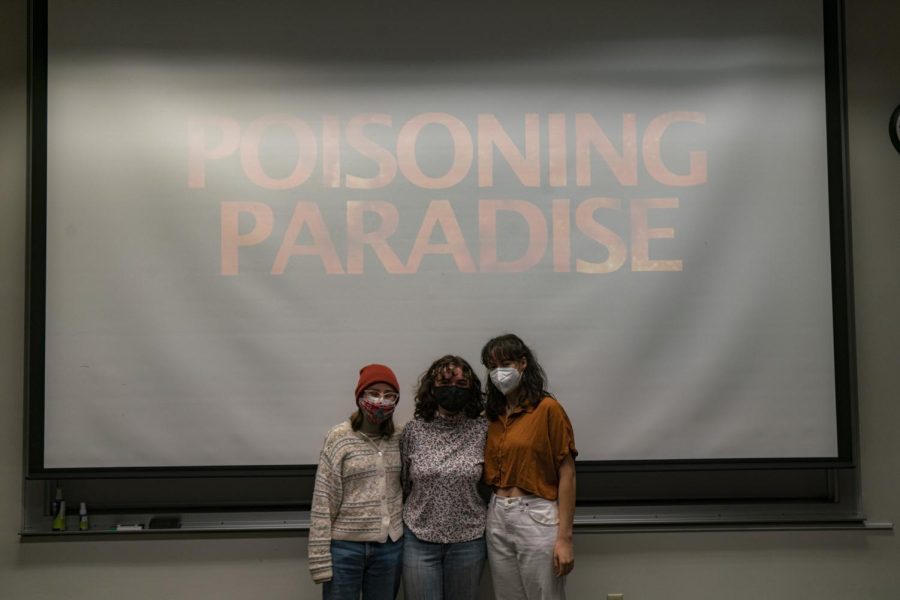“Poisoning Paradise” Film Festival Discusses Indigenous Environmental Justice
Emily Nielsen (left), Keira Cruickshank (middle), and Faith Chamberlin (right) from Sustainable Student Action led the screening of “Poisoning Paradise”.
In their latest embrace of environmental justice, Seattle University’s Sustainable Student Action (SSA) group connected with the “Poisoning Paradise” film festival. Highlighting a single film of the same name, the festival also featured several panel discussions centered around Indigenous-focused environmental justice. SSA attended the “Defending Indigenous Foodways” panel. To evoke discussion, SSA held a screening of the film on campus with an open invitation to the Seattle U community.
“Poisoning Paradise,” released in 2016, is a documentary following the fight against pesticide companies in Hawaii whose experimental products and testing fields directly impact the local communities, especially the native Hawaiian population. First-year Environmental Studies major Aoife Kennedy attended the screening.
“I thought it was really insightful,” Kennedy said. “I think anything like this just reminds people of the importance of being involved.”
Evan Wilhite, a first-year nursing major, also responded well to the documentary.
“I really liked how much they backed up their information, and how they pointed out which pesticide companies are withholding information,” Wilhite said.
SSA considers food justice and Indigenous sovereignty as part of their intersectional mission of striving for just environmental practices. Hosting a screening of the film became a learning experience for everyone involved.
“In my biology classes we learn a lot about environmental pollutants,” Faith Chamberlain said, a fourth-year biology student and member of SSA. “In the movie they mentioned “Silent Spring” [written by Rachel Carson, 1962], yet we never talk about the current reality of what’s going on.”
Emily Nielsen, a fourth-year environmental studies and public affairs double major, is one of the SSA members who coordinated the event. She noted that the variety of panels held by the festival dove deeper into the issues at hand.
“The panels that were put on throughout the last couple months as part of the film festival definitely touched more on capitalism and colonialism than the film and talked directly with folks that have lived experiences, as opposed to the expert opinions in the film,” Nielsen said.
SSA’s current initiative for on-campus action is focused on incorporating more conscious consumption practices for the school’s dining facilities.
“Seattle U’s contract with Coca-Cola ends in 2023,” Keira Cruickshank explained, another member of SSA and fourth-year sociology student. “It is not a huge ask to not renew the contract and instead choose ethical, local and sustainable procurement systems, which also lives out our principles of social justice as a Jesuit institution. The people we’ve spoken to have been very responsive.”
SSA has been meeting with the President’s Committee for Sustainability and other relevant offices over the past few years in regard to changing the school’s beverage contractor.
“At this point, it’s about hearing from students and anyone who uses C-Street, and what they want to see from their vendors,” said Nielsen.
All students and Seattle U community members are invited and able to get involved with the SSA. The SSA can be reached at sustainablestudentaction@gmail.com and on Instagram @SeattleU_SSA.


